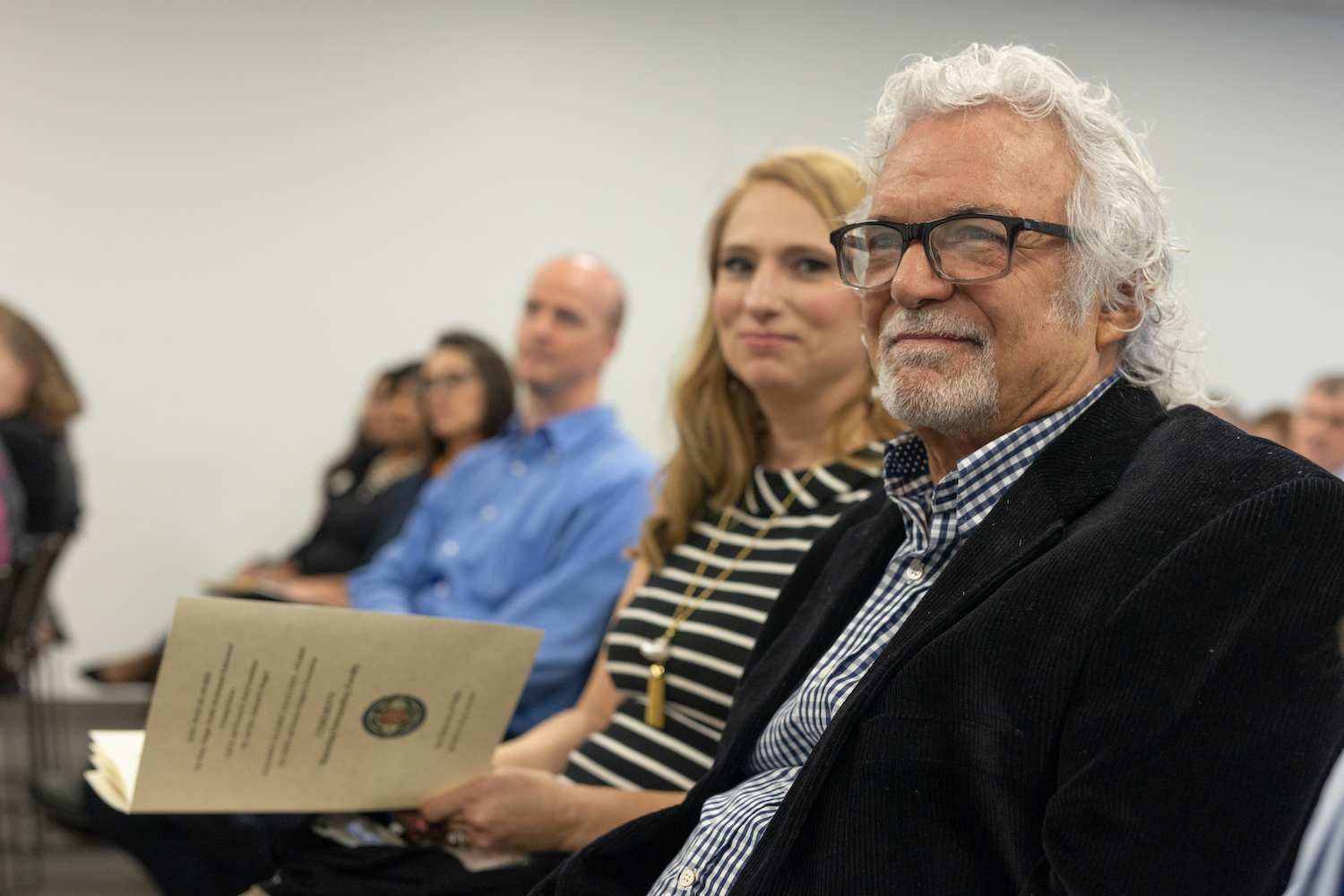 Menu
Menu

Fellow psychology professor Amy Fisher Smith, Ph.D., delivered the following speech in honor of Scott Churchill, Ph.D., at this year’s King / Haggar Awards Ceremony in January. Edited for style, it is being published today to commemorate the retirement of Churchill, who taught his first class at UD in fall 1981 and his final class last week on May 4.
I am honored today to recognize the excellent teaching, scholarship, longtime service and now retirement from the university of Scott Churchill, Ph.D.
It is really difficult for me in a few short minutes to try and capture all of Dr. Churchill’s accomplishments — the impact of his teaching, scholarship and service has been and continues to be local, national and international in scope. Dr. Churchill has taught at the university for over 40 years, and during that time, he has truly sculpted and shaped our Department of Psychology, helping to articulate the department’s commitment to a human science and phenomenological orientation as well as developing the curriculum and program of research leading to the thesis for our seniors. He has been a mentor to me and a mentor to Dr. Gilbert Garza, and in this way, we carry on the legacy created by him and others in our department.
Dr. Churchill has served as chair of the department, and he was founding director of our master’s program in psychology. In terms of teaching, he can make an imposing presence in the classroom given his breadth of knowledge, and for this, students do not forget him. Dr. Churchill has taught courses over his long career in methodology, depth psychology, projective techniques, primate studies, film studies, lifespan development and, most recently, in collaboration with Dr. Deanna Soper in the Department of Biology, tropical ecology. He loves to collaborate with other colleagues across disciplines, and I would say that in his later years of teaching, he has been much more interested in the students’ personal development and transformation as individuals vis-à-vis their engagement with each other and with the course texts. Dr. Churchill is above all a scholar who wants his students to grapple with primary sources. His commitment to his students’ growth and development has paid off in spades. Students have said things like, “I was determined not to buy all the books for this class, but after experiencing the class and our discussions, they are now my most prized possessions.” Students often describe these classes as “life-changing,” their “favorite course at UD.”
Dr. Churchill has been recognized nationally and internationally for his lifelong scholarship in the existential phenomenological method that in many ways he forged at the University of Dallas. He recently published a book on the phenomenological research method, and he has published countless articles and book chapters over the years in the areas of phenomenological research, human-bonobo communication, second-person perspectivity and empathy. He is someone who is always presenting a keynote or invited address at an academic and professional conference. These professional presentations take him all over the world, from Australia to India to Sweden to Italy and beyond. He is a fellow of the American Psychological Association (APA). In 2013, the APA presented him with the Mike Arons and E. Mark Stern Award for Outstanding Lifetime Service to the Society for Humanistic Psychology. In 2014, he was named a Piper Professor by the Minnie Stevens Piper Foundation, and he was co-named with our Psychology Department as recipient of the APA’s Charlotte and Karl Bühler Award for Significant and Lasting Contributions to Humanistic Psychology. He has served for 18 years as the editor-in-chief for The Humanistic Psychologist, the division journal for the Society for Humanistic Psychology, a division of the APA. Dr. Churchill is a past president of two divisions of the APA. He was elected three times to the APA’s Council of Representatives, and he was instrumental in changing the association’s ethics policy to ban any involvement of American psychologists in national security interrogations and torture.
In addition to his tireless work and service to our department, to the APA and to Division 32 in particular, Dr. Churchill is incredibly active in the community as well. He is a fellow of the Dallas Institute of Humanities and Culture, for which he often provides engaging film discussions and presentations. He is senior film and performing arts critic for the Irving Community Television Network and has been a film critic for nearly 40 years with extensive involvement in the Dallas Film Festival. He has also been affiliated locally and nationally with the Jane Goodall Foundation’s Roots & Shoots program and has helped to set up programs for them in Irving, Trento, Bari and Bangalore. Dr. Churchill has an abiding interest in the arts, so you can always find him at one of our art openings at UD, the Dallas Symphony, the Dallas Museum of Art or the Dallas Zoo.
Most importantly to our department, we are just going to miss such an active and driving force of a person who has left a monumental mark on our history. At these times, it is hard to let go, but we must, and we must wish Dr. Churchill the very best in retirement, which brings its own joys and adventures.